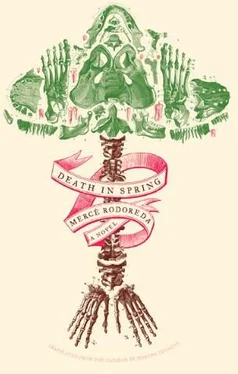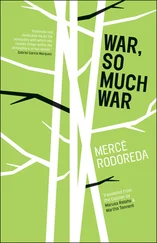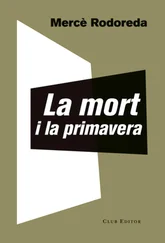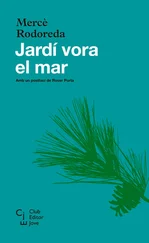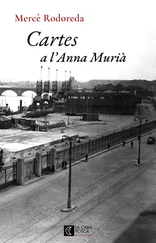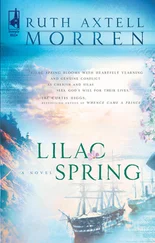Caramens , the shadows that crept among the shrubs, always threatening to attack the village. When a horse was born, the village held a Festa, but they didn’t lock us in cupboards, nor did they lock us up during the Festa Major celebrations that began with the watchmen’s dance and continued with people getting ahead of themselves in the race. They used to say that the day a man got ahead of himself, from then on he would have it easy, or mostly. Before dinner — after the dance and the race — a man, alone and naked, would enter the river and swim under the village to the other side, to ensure that the water had not dislodged any rocks, that the village was not about to be washed away. Sometimes the man emerged with his face ravaged, sometimes ripped away.
The ivy that crept up the cliff to Senyor’s house died each year. The autumn wind stripped it naked, and all the courtyards were strewn with crimson leaves. This is the only thing Senyor gives us, they said, other than children when he was young. But not now. And they would laugh and look up at the windows. When all the ivy leaves had fallen, we boys collected them in our baskets and left them to dry; then we piled them up in the Plaça. When we burned them, we would look up because Senyor’s head would appear through the long, narrow, middle window, and we would stick out our tongues at him. He would remain motionless, as if made of stone, and when the blue smoke disappeared, he would close his window, and that was it until the following year.
Senyor’s eyrie was on the top of the mountain and the mountain was small. It looked like it had been split in two by an axe. No one ever went to the other side of the mountain. They built the village over the river, and when the snows melted, everyone was afraid the village would be washed away. That is why every year a man entered the water on the upper side and swam under the village and came out on the lower side. Sometimes dead. Sometimes without a face because it had been ripped away when the desperate water hurled him against the rocks that supported the village.
At night you could hear groans beneath the beds; the sounds were coming from the river, as if the earth were groaning, on the point of carrying everything away, as if everything would vanish with the water. But it didn’t. The village remained, and only the water slipped secretly away. It was calm when it first arrived, but then turned wild with foam because it had dwelt so long in the dark. As though it had been frightened by being locked up for so long. I would sleep, and before falling asleep, or when I slept without sleeping, I used to think about things. I remembered my mother, without wanting to remember: straight and thin, with a red streak in her eyes. She used to beat children and spoil wedding nights. She would stand outside the newlyweds’ window on their wedding night, howling like a dog until the sickly morning light finally silenced her. No one paid any attention to mother’s howls, because she explained that her mother’s mother had done the same, as did all the women on her side of the family. Like lightning, she would bolt out of the house as soon as the newlyweds closed themselves inside, and she would begin to yell and yell with her twisted mouth. When mother was dead and had been buried for some time, I–I alone — heard her crying out beneath my father’s window the first day he and my stepmother slept together. It lasted until the first taste of light appeared.
One of my stepmother’s arms was much shorter than the other. Before I fell asleep I would think about my stepmother’s little arm, and I thought about the empty star in the cupboard where they locked me when they went to dance and laugh at funerals. I thought about the crimson powder and the cloud of souls and the tiny, reddish-purple heather that bloomed in autumn all across Maraldina. I thought about the sacks that bumped against the walls as we climbed out of the cave. The old men from the village, from the slaughterhouse, would come to the house when father was working in the fields. They brought things with them, and my stepmother would say to me: go help your father. And I would go, but when I would turn back to look at the house, it seemed to me that all around it wisteria roots were forcing it upward. I would walk along, kicking the dust, stopping at times to throw a stone at a lizard to cut off its tail, and then I would watch the tail trying to live, alone and desperate, until it became unbearable.
When I got out of the water I was fascinated by the sulphur dust that came from the marriage of flowers. A patch of it floated in a corner of the water. The sun was so strong that it made the blue round it less blue. Some sleeping fog broke up above the dog rose. When I had finished planting the grass, I thought again about Senyor’s house. I could see the side of it, the side without windows. It was topped by a spire. I could see Senyor, in my thoughts, coughing and eating honey, waiting always for the river to carry away the village. The ivy, high on the rock, was green. From time to time two men with long canes would thrash the new sprouts that wanted to creep up the house. The shredded leaves would fall down the cliff, their tender blades and little hands uprooted, down, down to the roofs and courtyards. The ivy had to be cut back or it would devour the walls. Every time one of the men struck furiously with his cane, causing bits of leaves to fall, Senyor leaned out and looked down, his hands resting on the windowsill.
I decided to stroll through the soft grass, up the incline; at the end of the slope the tree nursery appeared from behind some shrubs. The seedlings had tender trunks and no leaves; but after they were transplanted in the forest and grew tall, they would all carry death inside them. I walked among them, and they looked like objects you see only when you’re asleep. I stopped at the entrance to the forest, at the divide between sun and shadow. I had seen the cloud of butterflies earlier. The trees in the forest were very tall, full of leaves — five-point leaves — and, just as the blacksmith had often told me, a plaque and a ring were attached to the foot of each tree. There were thousands of butterflies, all white. They fluttered about anxiously; many of them looked like half-opened flowers, the white slightly streaked with green. The leaves stirred and a splash of sun jumped from one to another; in between you could see speckles of blue. The ground was carpeted with old, dry leaves, and a rotten odor rose from beneath them. I picked up a leaf that was only a web of veins, like the wood and beams of a house, with nothing binding them together. I lay down under a tree and watched the cloud of butterflies bubble among the leaves. I looked at them through the web of leaf veins until I was tired, and as soon as I let it fall, I heard footsteps.
I jumped up and hid behind a shrub. The steps came closer. The shrub had a yellow, half-unsheathed flower and five leaves that gave off a prismatic sheen. The bee was sheltering there, dusting off its legs. I was sure it was the bee that had crossed the river and followed me from the village.
The steps stopped. Everything was quiet. As I strained to listen, I thought I could hear someone breathing. I felt a weight in the middle of my chest from listening: the same uneasy feeling I had when they locked me in the cupboard for hours, and the village was deserted, and I would wait. That was how I felt now. Nothing had changed: the leaves were the same, and the trees and butterflies, and the sense that Time inside the shadow was dead. But everything had changed.
I heard the steps again, closer now, and saw a bright flash under the leaves. The man who was approaching carried an axe on his shoulder and a pitchfork in his hand. He was naked from the waist up, his forehead smashed. His face had been disfigured by the rushing river, and he was unable to shut his eyes because the skin on his forehead had healed poorly. His red, shrunken skin was pulled tight, always leaving a slit in his eyes. He had patches of black hair on his chest; his body was sunburned.
Читать дальше
